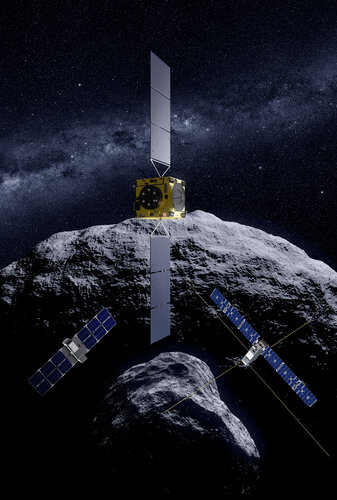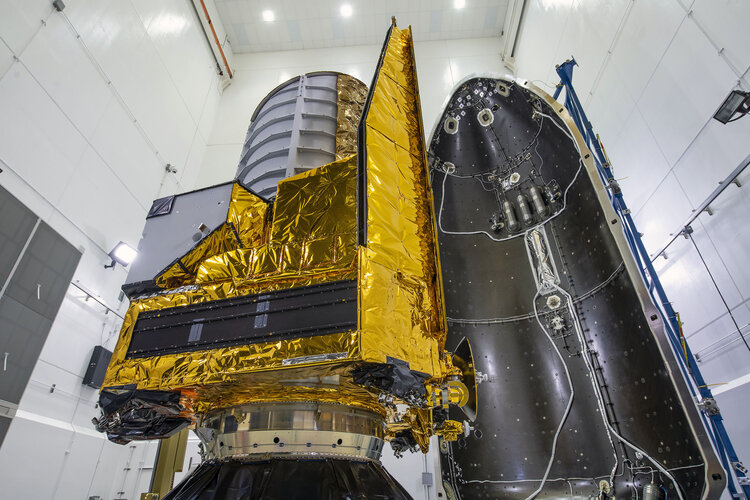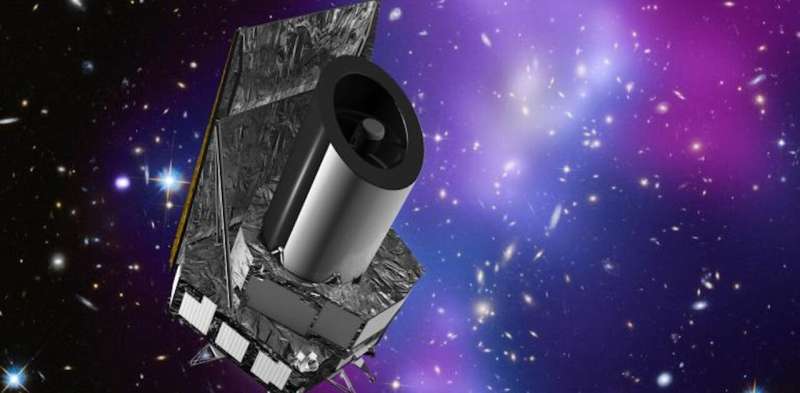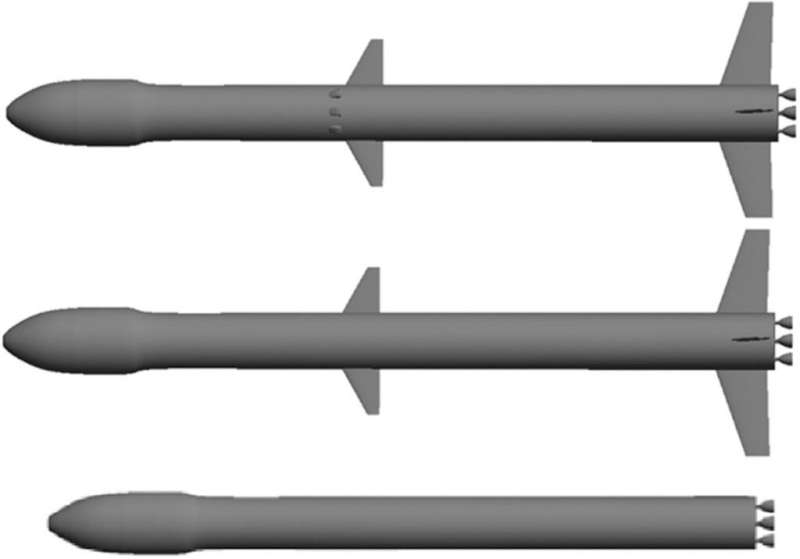
Copernical Team
Precision deployer to put Hera’s CubeSats into asteroid orbit

Dutch firm ISISPACE has manufactured more than 600 cereal-box sized ‘CubeSat’ satellites, plus nearly 200 deployment systems used to release them into orbit. Of all of these, the pair of Deep Space Deployers it has overseen for ESA’s Hera asteroid mission for planetary defence have been by far the most challenging. The two systems need to keep their nanosatellite cargo alive and healthy, before releasing them on a precisely staged basis – at a velocity of just a few centimetres per second. Any faster and Hera’s CubeSats would risk getting lost in space.
Maxar and Esri Expand Partnership to Visualize Precision3D in ArcGIS Living Atlas of the World
 Maxar Technologies, a leading provider of comprehensive space solutions and secure, precise geospatial intelligence, has recently declared that its Precision3D data will be made available for visualization in Esri's ArcGIS Online Living Atlas of the World.
Esri, recognized worldwide for its pivotal role in location intelligence, will embed Maxar's Precision3D Digital Surface Model, Digital
Maxar Technologies, a leading provider of comprehensive space solutions and secure, precise geospatial intelligence, has recently declared that its Precision3D data will be made available for visualization in Esri's ArcGIS Online Living Atlas of the World.
Esri, recognized worldwide for its pivotal role in location intelligence, will embed Maxar's Precision3D Digital Surface Model, Digital 'Godfather of AI' urges governments to stop machine takeover
 Geoffrey Hinton, one of the so-called godfathers of artificial intelligence, urged governments on Wednesday to step in and make sure that machines do not take control of society.
Hinton made headlines in May when he announced that he quit Google after a decade of work to speak more freely on the dangers of AI, shortly after the release of ChatGPT captured the imagination of the world.
Th
Geoffrey Hinton, one of the so-called godfathers of artificial intelligence, urged governments on Wednesday to step in and make sure that machines do not take control of society.
Hinton made headlines in May when he announced that he quit Google after a decade of work to speak more freely on the dangers of AI, shortly after the release of ChatGPT captured the imagination of the world.
Th Europe's space telescope to target universe's dark mysteries
 Europe's Euclid space telescope is scheduled to blast off Saturday on the first-ever mission aiming to shed light on two of the universe's greatest mysteries: dark energy and dark matter.
The launch is planned from Cape Canaveral in Florida at 11:11 am local time (1511 GMT) on a Falcon 9 rocket of the US company SpaceX.
The European Space Agency was forced to turn to the rival firm of bi
Europe's Euclid space telescope is scheduled to blast off Saturday on the first-ever mission aiming to shed light on two of the universe's greatest mysteries: dark energy and dark matter.
The launch is planned from Cape Canaveral in Florida at 11:11 am local time (1511 GMT) on a Falcon 9 rocket of the US company SpaceX.
The European Space Agency was forced to turn to the rival firm of bi Astronomers reveal evidence of universe's 'background hum'
 Astronomers across the world announced on Thursday that they have found the first evidence of a long-theorised form of gravitational waves that create a "background hum" rumbling throughout the universe.
The breakthrough - made by hundreds of scientists using radio telescopes in North America, Europe, China, India and Australia after years of work - was hailed as a major milestone that ope
Astronomers across the world announced on Thursday that they have found the first evidence of a long-theorised form of gravitational waves that create a "background hum" rumbling throughout the universe.
The breakthrough - made by hundreds of scientists using radio telescopes in North America, Europe, China, India and Australia after years of work - was hailed as a major milestone that ope SpaceX Dragon to return to Earth with experiments, samples from ISS
After long wait, Virgin Galactic begins commercial spaceflights
 Virgin Galactic is set Thursday to finally begin commercial spaceflights, a major milestone for the company founded in 2004 by British billionaire Richard Branson.
Its first paying customers are a three-member crew from the Italian Air Force and National Research Council of Italy, with a fourth seat occupied by a Virgin Galactic astronaut instructor.
Dubbed Galactic 01, the 90-minute mis
Virgin Galactic is set Thursday to finally begin commercial spaceflights, a major milestone for the company founded in 2004 by British billionaire Richard Branson.
Its first paying customers are a three-member crew from the Italian Air Force and National Research Council of Italy, with a fourth seat occupied by a Virgin Galactic astronaut instructor.
Dubbed Galactic 01, the 90-minute mis Last glimpse of Euclid on Earth
 Image:
Image:
On 27 June, this last glimpse of ESA’s Euclid space telescope was caught right before it was encapsulated by a SpaceX Falcon 9 fairing, meaning that the nose of the rocket was installed over the spacecraft.
Euclid is 4.7-m tall and 3.7-m in diameter, fitting nicely in the Falcon 9 fairing with height of 13.1-m and width of 5.2-m.
The Euclid satellite is getting ready for the target launch date of 1 July 2023 from Cape Canaveral in Florida, USA. The Falcon 9 fairing will keep Euclid safe and clean during the last days before lift-off and it will protect the spacecraft
Euclid space mission is set for launch: Here's how it will test alternative theories of gravity

The European Space Agency's (Esa) Euclid mission will launch into space on a Falcon9 rocket from SpaceX on July 1, or soon after. Many of us who have worked on it will be in Florida to watch the nail-biting event.
The mission is specifically designed to study the dark universe, probing both "dark matter" and "dark energy"—unknown substances thought to make up 95% of the energy density of the universe.
But it will also be able to test some strange, alternative models of gravity—potentially challenging Albert Einstein's great theory of general relativity.
Scientists have known about the existence of dark matter for nearly a century now. It was proposed after astronomers noted that galaxies in clusters had mysteriously high speeds. Such speeds should cause the clusters to evaporate unless there was some extra mass holding them together. As this matter wasn't shining in the same way as the visible galaxies, it was dubbed dark matter.
Gravitational lensing is a new tool to see this dark material. This effect relies on our understanding of general relativity.
Reusable rockets could fly back to their launch sites with wings

Reusable launch vehicles have been a boon for the commercial space industry. By recovering and refurbishing the first stages of rockets, launch providers have dramatically reduced the cost of sending payloads and even crew to space. Beyond first-stage boosters, there are efforts to make rockets entirely reusable, from second stages to payload fairings. There are currently multiple strategies for booster recovery, including mid-air retrieval using helicopters and nets. Still, the favored method involves boosters returning to a landing pad under their own power (the boost-back and landing maneuver).
This strategy requires additional rocket propellant for the booster to land again, which comes at the expense of payload mass and performance for the ascent mission. As an alternative, researchers from the National Office Of Aerospace Studies And Research (ONERA) propose two new types of strategies that would allow boosters to return to their launch site.
